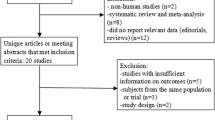Abstract
Objective: To assess the safety profile of acarbose treatment over a 1-year period at a dose range of 50–300mg three times daily in patients with type 1 or type 2 diabetes mellitus.
Study design and patients: In this 56-week, double-blind, parallel-group, multicentre comparison, patients were randomised to acarbose or placebo in a 2: 1 ratio. An 8-week forced titration phase (from 50–300mg three times daily) was followed by a 48-week maintenance phase during which patients received the highest dose tolerated during titration. Patients were assessed at 13 visits with respect to adverse events/intercurrent illnesses, abnormal laboratory values (serum chemistry, urinalysis, complete blood and reticulocyte count, serum iron and total iron binding capacity, and serum vitamin B6, B12, D and folate levels), discontinuation rates, ECG findings, vital signs and evaluation of the patients’ diaries with regard to gastrointestinal events. A total of 359 patients (acarbose 240, placebo 119) were valid for analysis; 21% had type 1 diabetes. Most patients received concomitant insulin or sulfonylurea treatment.
Results: Study withdrawal was reported for 35% of acarbose and 24% of placebo recipients (p = 0.053); adverse events were the main reason for withdrawal in acarbose recipients (20%; placebo group 5%; p < 0.01). The most common adverse events for acarbose recipients were gastrointestinal (abdominal pain, flatulence and diarrhoea), which were more frequent than in placebo patients (p < 0.01). These events occurred more often early in the study and attenuated over time.
Conclusion: Acarbose was safe and well tolerated by the majority of diabetic patients over a 1-year treatment period.



Similar content being viewed by others
References
Laube H. Acarbose: an update of its therapeutic use in diabetes treatment. Clin Drug Invest 2002; 22(3): 141–56
Dimitriadis G, Karaiskos C, Raptis S. Effects of prolonged (6 months) alpha-glucosidase inhibition on blood glucose control and insulin requirements in patients with insulin-dependent diabetes mellitus. Horm Metab Res 1986; 18(4): 253–5
Breuer H-WM. Review of acarbose therapeutic strategies in the long-term treatment and in the prevention of type 2 diabetes. Int J Clin Pharmacol Ther 2003; 41(10): 421–40
Rios MS. Acarbose and insulin therapy in type 1 diabetes mellitus. Eur J Clin Invest 1994; 24Suppl. 3: 36–9
Hollander P, Pi-Sunyer X, Coniff RF. Acarbose in the treatment of type 1 diabetes. Diabetes Care 1997; 20(3): 248–53
Sels JPJE, Verdonk HER, Wolffenbuttel BHR. Effects of acarbose (Glucobay®) in persons with type 1 diabetes: a multicentre study. Diabetes Res Clin Pract 1998; 41: 139–45
Chiasson J-L, Josse RG, Gomis R, et al. Acarbose for prevention of type 2 diabetes mellitus: the STOP-NIDDM randomised trial. Lancet 2002 Jun; 359: 2072–7
Chiasson J-L, Josse RG, Gomis R, et al. Acarbose treatment and the risk of cardiovascular disease and hypertension in patients with impaired glucose tolerance: the STOP-NIDDM trial. JAMA 2003 Jul; 290: 486–94
Hanefeld M, Cagatay M, Petrowitsch T, et al. Acarbose reduces the risk for myocardial infarction in type 2 diabetic patients: meta-analysis of seven long-term studies. Eur Heart J 2004; 25: 10–6
Hasche H, Mertes G, Brans C, et al. Effects of acarbose treatment in type 2 diabetic patients under dietary training: a multicentre, double-blind, placebo-controlled, 2-year study. Diabetes Nutr Metab 1999; 12: 277–85
Mertes G. Safety and efficacy of acarbose in the treatment of type 2 diabetes: data from a 5-year surveillance study. Diabetes Res Clin Pract 2001; 52: 193–204
Hollander P. Safety profile of acarbose, an α-glucosidase inhibitor. Drugs 1992; 47Suppl. 2: 47–53
National Diabetes Data Group. Classification and diagnosis of diabetes mellitus and other categories of glucose intolerance. Diabetes 1979; 28: 1039–57
May C. Efficacy and tolerability of stepwise increasing dosage of acarbose in patients with non-insulin-dependent diabetes mellitus (NIDDM), treated with sulfonylureas [in German]. Diabetes und Stoffwechsel 1995; 4: 3–8
Ceriello A. The post-prandial state and cardiovascular disease: relevance to diabetes mellitus. Diabetes Metab Res Rev 2000; 16: 125–32
Duckworth WC. Hyperglycemia and cardiovascular disease. Curr Atheroscler Rep 2001; 3: 383–91
American Association of Clinical Endocrinologists. Medical guidelines for the management of diabetes mellitus. Endocr Pract 2002; 8Suppl. 1: 40–82
Coniff R, Krol A. Acarbose: a review of US clinical experience. Clin Ther 1997; 19(1): 16–26
Fischer S, Hanefeld M, Spengler M, et al. European study on dose-response relationship of acarbose as a first-line drug in non-insulin-dependent diabetes mellitus: efficacy and safety of low and high doses. Acta Diabetol 1998; 35: 34–40
Coniff RF, Shapiro JA, Robbins D, et al. Reduction of glycosylated hemoglobin and postprandial hyperglycemia by acarbose in patients with NIDDM. Diabetes Care 1995; 18(6): 817–24
Chiasson J-L, Josse RG, Hunt JA, et al. The efficacy of acarbose in the treatment of patients with non-insulin-dependent diabetes mellitus: a multicenter controlled clinical trial. Ann Intern Med 1994; 121(12): 928–35
Riccardi G, Giacco R, Parillo M, et al. Efficacy and safety of acarbose in the treatment of type 1 diabetes mellitus: a placebo-controlled, double-blind, multicentre study. Diabet Med 1999; 16: 228–32
Acknowledgements
This study was supported by a research grant from Bayer AG, Germany. Dieter Neuser, Alice Benson, Andreas Brückner and Dieter Petzinna are all employees of Bayer HealthCare AG.
Author information
Authors and Affiliations
Corresponding author
Rights and permissions
About this article
Cite this article
Neuser, D., Benson, A., Brückner, A. et al. Safety and Tolerability of Acarbose in the Treatment of Type 1 and Type 2 Diabetes Mellitus. Clin. Drug Investig. 25, 579–587 (2005). https://doi.org/10.2165/00044011-200525090-00003
Published:
Issue Date:
DOI: https://doi.org/10.2165/00044011-200525090-00003




